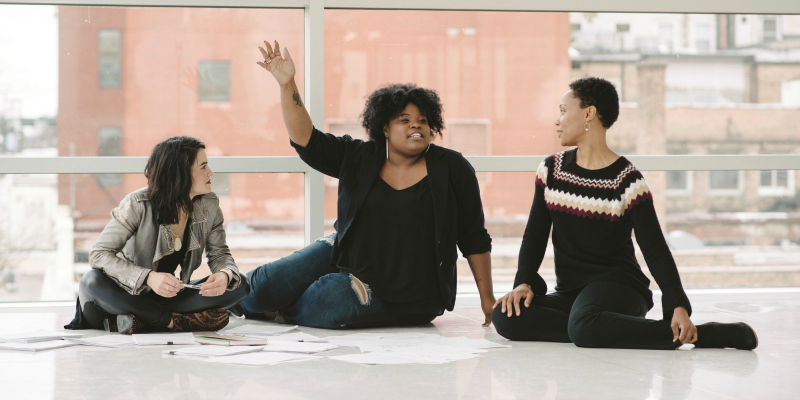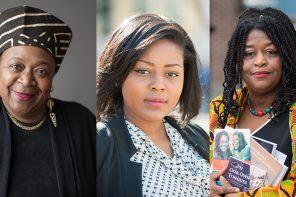Theatre LILA’s “Lines” Gives Voice to Women of Color
By Rachel Werner | Photographed By Hillary Schave
Five women of color embark on a journey to a destination they can’t name, but they hope is better than the oppressive spaces they’re departing. En route, their collective pain, sadness and confusion is pronounced— a stark contrast to the loyalty, prowess and wit woven as a continuous thread through intimate dialogue.
Closing out Theatre LILA’s 2017-2018 season, “Lines” is meant to sharpen its audiences’ ears, minds and hearts to the external struggles and internal turmoil that women of color grapple with daily.
“When we as an organization plan our seasons we always ask, ‘what stories do we need to tell this year?’ It was obvious to us in February last year that a piece centering around women was absolutely where we wanted to take our staged stories,” says LILA’s artistic director Jessica Lanius.
LILA is partnering with American Players Theatre core company member Melisa Pereyra, who will direct “Lines,” and the play’s writing team, Atra Asdou, Olivia Dawson, Malkia Stampley and Aidaa Perzeeda, Lanius says.
Pereyra says the impetus for her to co-write a play of this magnitude was personal as well as pragmatic.
As an immigrant and a woman, she feels the weight of the current political climate every day. Pereyra admits, “Sometimes I feel crazy when I am the only woman or minority in the room. We created this play in order to have real conversations without people of color having to explain themselves first.”
Milwaukee-based actress LaChrisa Grandberry is also hopeful audience members will absorb the scenes portrayed beyond macro-societal reflections, allowing the content to penetrate on a deeper level. “There’s so many people trying to tell our stories second- hand. Why not hear it from the women who’ve lived it and know it well?” she states.
On stage Grandberry and her castmates preserve the artistic integrity of the writers’ intentions, a play written and produced by women of color performed by women of color. The time has arrived to authentically and unapologetically convey their perspectives, co-writer Malkia Stampley says. ‘It’s about planting seeds and providing a counter balance,” she shares. “It’s not about pushing other people out, but more so about giving ourselves a voice when we don’t have enough of one.”
The collective force of the sum, however, is not meant to stifle the singular narratives each woman imparts. Each character’s presence on the stage stands alone—a mother obsessively trying to stay on top of mainstream parenting trends; a woman of mixed ethnicity repeatedly having to clarify her race; a young girl seemingly oblivious to all the tension she’s coming of age in. But their stories unite the group further as their vulnerability and suffering come to light. Co-playwright and UW-Madison alum Olivia Dawson reveals, “What I have found interesting is how each of our individual voices, stories and beliefs is very different and very specific, culturally, but that there is still this fundamental understanding and this moment of, ‘I see you. I hear you.’ And how the specifics of a life illuminate the humanity in each of us. We are different and that difference is a cause for celebration, an opportunity for conversation—and hopefully empathy and understanding.”
The production simultaneously tugs on the heart strings and jars the mind, a thought-provoking hallmark to LILA’s growing repertoire with challenging themes poised to illicit an emotional reaction in the theater and reverberate through the community long after the curtain closes. Lanius explains, “Lines is our attempt at tackling the ‘now-issues’ that face women of color daily. We hope that putting the voices and experiences of women of color center stage in the Overture Center is exciting for our Madison audiences and continues to bring more people to the theatre to experience this play and more.”
For Pereyra the main objectives remain to provide a broader context for real change to occur—and to create safe spaces for the necessary conversations she thinks continue to be silenced by the vacuum of polarization. “Our words start with assumptions. Whether correct or incorrect, it’s what’s in the question.” she proclaims. “As we try to cross or erase these lines, we might all find ourselves at a lot more crossroads.”




